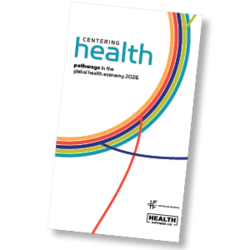Pathways in the Global Health Economy 2026

The need for health is clear, the pathway to producing it is less so. Health emerges from intricate interactions among five key determinants: individual behavior, social factors, genetics and biology, environment, and medical care.
 Over the past 20 years, we have made tremendous advances in health and health care through scientific discovery, technological innovation, and reorganization of health services. During this time, rising health consumerism has driven a focus on engaging consumers. Yet costs and chronic conditions continue to rise across all middle- to high-income countries, and disparities persist. Pressure for economically sustainable health and health care is increasing. Continuing down the same path, we can foresee a robust global health economy ten years from now with more offerings delivering health care, but not necessarily producing health.
Over the past 20 years, we have made tremendous advances in health and health care through scientific discovery, technological innovation, and reorganization of health services. During this time, rising health consumerism has driven a focus on engaging consumers. Yet costs and chronic conditions continue to rise across all middle- to high-income countries, and disparities persist. Pressure for economically sustainable health and health care is increasing. Continuing down the same path, we can foresee a robust global health economy ten years from now with more offerings delivering health care, but not necessarily producing health.
What if we put producing health front and center instead? The aim would be a global health economy in 2026 in which we produce not just an expanding array of health goods and services for the few, but health itself for the many. In this economy, financial and social wealth would be built on the foundation of health. It would be understood that the cost of producing health for the many is not just an expenditure but also an investment.
With Centering Health: Pathways in the Global Health Economy 2026, the Health Futures Lab invites you to reimagine how to design viable pathways to health for the many. These pathways navigate the territories central to producing health—the determinants of health—while at the same time responding to and leveraging four larger social, economic, and technological forces that we have identified as most likely to impact health and health care over the next decade. These future forces are: divergent life expectations, expanding health authorities, embedded machine learning, and inclusive design.
 The past 20 years of innovation, market expansion, and consumer engagement in health and health care equips us to move on to the next era of the global health economy: delivering health to the many at a sustainable cost. Human expectations, advances in biological and genetic science, burgeoning capacity of machine learning, and the ability to design inclusive interventions make
The past 20 years of innovation, market expansion, and consumer engagement in health and health care equips us to move on to the next era of the global health economy: delivering health to the many at a sustainable cost. Human expectations, advances in biological and genetic science, burgeoning capacity of machine learning, and the ability to design inclusive interventions make
this goal well within our reach. However, we will need to engage all of the determinants of health, deploy them in concert, and design holistic and lean interventions with the goal of reaching those with the least resources as well as those with the greatest. As the burden of rising chronic conditions among rich and poor nations and growing health care costs strain societies across the globe, health and health care stakeholders will experiment in constructing approaches to producing health that are equitable, cost-efficient, and sustainable: approaches that recognize health, itself, as the essential ingredient for social and economic development—interventions that center health.
Interested in learning more?
Contact Sean Ness | sness@iftf.org



